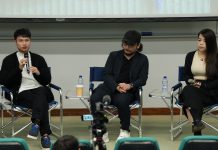His action first caught the public’s attention after he posted a link to his blog in a comment on an article by cultural critic and writer Chan Wan about boycotting fast-food chain Cafe de Coral. Pong’s blog chronicled his one-man action against the conglomerates.
He never expected his boycott would resound so loudly in the community or that he would receive so much media attention. Within two months of his post, seven different newspapers sought him out and interviewed him.
He became a regular in newspapers, on the radio and on television programmes. He received more than a thousand messages on his blog. “It is really encouraging for people who are making changes as people give you an immediate response,” he says.
At the beginning of the year, Pong was selected as one of 17 “local heroes” by Mingpao Weekly. He scanned the article and posted it onto his blog. Pong seems unfazed by his newfound fame; it just gives him a platform to spread his message. “I think Hong Kong people tend to listen to people who are well-known. So, I am not embarrassed,” he says.
Pong has been invited by hundred of schools, non-governmental organisations and even listed companies in Central to give talks on conscientious consumption and his views about social developments.
The most frequent question he gets asked at these talks is: “How can I discriminate between small shops and stores owned by property developers?”
But he feels this is the wrong question. “Even if you know how to distinguish between shops owned by property developers and small shops, you would not have the motivation to take action. You rationally know the answer, but so what?”
Pong’s answer is you do what you can. There are always limitations and exceptions, even for a person as committed as he is. For instance, he avoids buses but not the MTR. He explains this is because despite being sold off to developers, the government is still a big shareholder in the MTR Corporation, so the subway still “possesses the characteristics of public transport”.
He also takes the New World First Ferry, which is now owned by New World Development, one of the local developers. “Would you want the ferries to disappear? Ferries are a local characteristic.”
Another example is the Chinachem Cinema Circuit. Although it is operated by developers, Pong goes to midnight shows there because these are rarely offered by other cinemas. “It has its value. It offers alternatives in our life,” he says. “It is not always merely about boycotting land developers. You always have to wrestle and seek balance.”
In the past, Pong would just ignore people who disagreed with him and regard their criticisms as meaningless. But now Pong listens to them. “They inspire me to figure out how to refine my argument. I know how to follow their mindset and respond to them.”
On the last day of his one-year campaign, Pong did not celebrate nor even write a blog to conclude his crusade. “It has already become a part of my life, why do I need to celebrate?” he asks with a satisfied smile.
To him, the campaign has become an indispensable part of his life. It has turned into a life-long commitment. “The influence of personal action is much stronger than simply giving the message verbally, so, I will go on.”
He hopes his protest will continue to persuade other Hong Kong people that they too can play a part in breaking the stranglehold of big business. He believes his one-man stand can make a big difference.






































